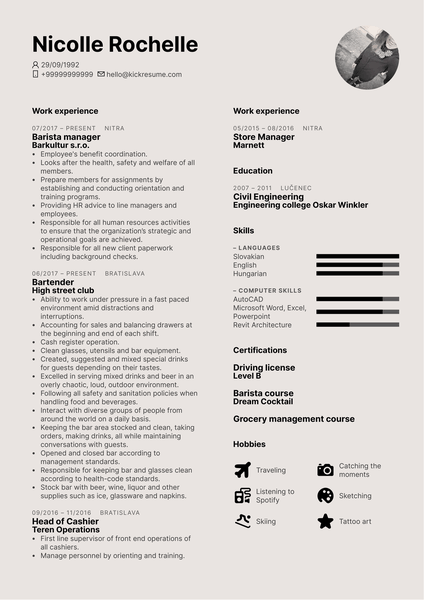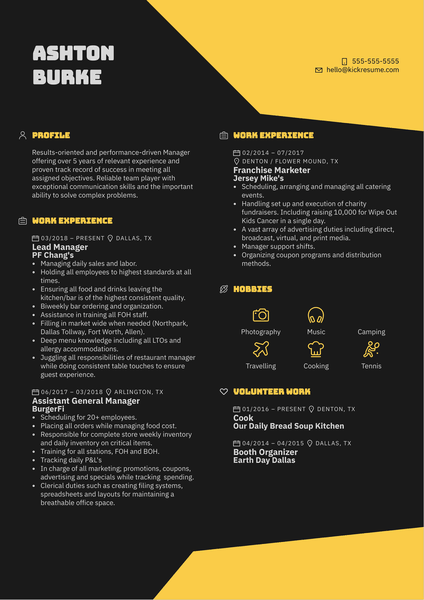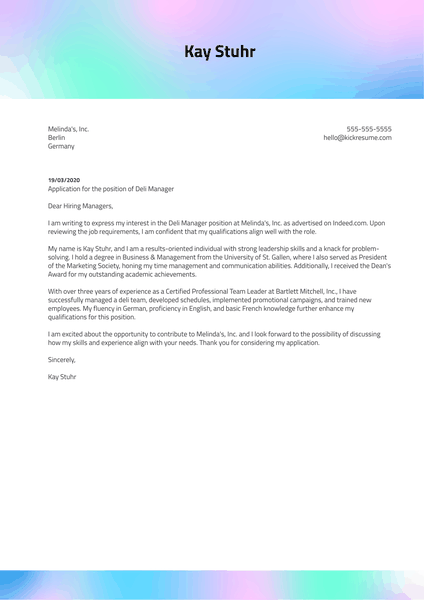How to build a job-winning restaurant manager resume
Restaurant managers keep the gears running behind the scenes to help guests enjoy a seamless dining experience. Here are some of the key things to consider when writing a restaurant manager resume.
It’s rare for diners to interact with restaurant managers when enjoying a meal. But they’re working behind the scenes to keep everything running smoothly – from the dining room to the kitchen!
A restaurant is responsible for the day-to-day operations of a restaurant. They oversee all aspects of the business, from food preparation and customer service to financial management and staff scheduling. While the role can be demanding, if you enjoy working in hospitality, the experience can be extremely rewarding.
Some restaurants refer to restaurant managers as general managers, but the roles are typically the same.
Whether you have experience as a restaurant manager or perhaps you’re looking to grow your hospitality career, writing a resume that catches the eye is the first step.
To help you write a dynamic restaurant manager resume that will help you land the job, we’ve compiled 5 of our top resume-writing tips for restaurant managers.
Still looking for a job? These 100+ resources will tell you everything you need to get hired fast.
1. Start your restaurant manager resume with a strong summary
Most resumes should start with a summary and objectives statement – a restaurant manager resume is no exception. This is the first thing a recruiter or hiring manager will see and should immediately grab their attention.
The summary statement is your chance to highlight your experience and goals. Think of it as a snapshot of your success or an elevator pitch. Make sure to mention any relevant experience you have in the restaurant industry. If you have any specialties or areas of expertise, for example hiring staff or managing a kitchen, make sure to include those as well.
Your summary and objectives statement should clearly communicate who you are and what you're looking to accomplish as a restaurant manager. A strong summary and objectives statement is the best way to set your resume up for success.
2. Use metrics to quantify your restaurant management skills and experience
When you're applying for a restaurant manager role, metrics can really make your skills and experience stand out on your resume. Metrics are a quantifiable way to demonstrate the impact you've had in previous roles.
For example, if you’ve introduced strategies to increase total sales or improve your customer satisfaction scores, mention those changes. Even something as simple as years of experience can be improved by including the numbers. For example, mention how many restaurants you've overseen and the size of each one.
Here are some examples of statements than can transform the experience section on your restaurant manager resume
- Managed a team of restaurant staff.
- Managed a 32 restaurant staff members.
- Many years of experience in hospitality and restaurants.
- Over 6 years of experience in the hospitality and dining industry.
Specific, measurable examples of your abilities are more impactful than stating your experience. This will give potential employers a quantifiable sense of your experience as a restaurant manager.
3. Focus on impact versus tasks in your restaurant manager resume
When you reach senior roles, like a restaurant manager you’re responsible for a whole lot more than just checking a task off a list. You’re expected to make a difference.
Highlighting how you’ve made an impact in previous roles can differentiate you from a more junior or less experienced applicant for a manager role. It gives the hiring manager confidence that you’ll bring value to the restaurant.
Your previous roles should make it clear that you’re able to complete basic restaurant-related tasks.
Instead, use the valuable space on your resume to highlight the impact you’ve made.
Some examples of impact-driven statements for a restaurant manager include
- Introduced new staff retention strategy, decreasing turnover by 20%.
- Created new upsell strategy, resulting in a 10% growth in YoY revenue.
4. Highlight your leadership experience in a restaurant manager resume
As a restaurant manager, your top responsibility is managing your restaurant staff. This includes everyone from hosts, waiters, kitchen staff, and anything in between. With such a large team, solid leadership skills are a must-have when it comes to being a restaurant manager. You’re also expected to be able to motivate your team to meet high standards.
Your resume is where you should highlight your leadership experience and key examples. Being a senior role, it’s not enough to list “leadership” in the skills section of your resume.
Some keywords or phrases you can use throughout your resume to emphasize your leadership skills include
- Managed a team of 10 high-performing team leads.
- Spearheaded a project to implement a new point of sale system.
- Transformed the reservation process resulting in a 10% increase in occupancy rate.
5. Share your restaurant management qualifications and industry expertise
Restaurant managers are expected to be the go-to when any member of the staff has questions. They typically have a deep understanding of the food industry and are up-to-date on trends. Restaurant managers must be experts in everything from specific rules and regulations to general industry knowledge.
Being familiar with these rules will give you a leg up from other candidates.
As with resumes for most other jobs, the more expertise you can spotlight, the more likely that you’ll receive an interview invitation.
If you’ve been in the restaurant industry, a lot of this expertise will be second nature. But if not, a simple course or online resource can help you get up to speed before applying.
Whether you’re an experienced restaurant manager or looking to take the next leap in your career, Kickresume can help. Start with one of our restaurant manager examples and templates you’ll be shining a spotlight on your skills and expertise in no time.








![How to Write a Professional Resume Summary? [+Examples]](https://d2xe0iugdha6pz.cloudfront.net/article-small-images/i-Profile.svg)
![How to Put Your Education on a Resume? [+Examples]](https://d2xe0iugdha6pz.cloudfront.net/article-small-images/i-Collage-Universities.svg)
![How to Describe Your Work Experience on a Resume? [+Examples]](https://d2xe0iugdha6pz.cloudfront.net/article-small-images/Experience.svg)


